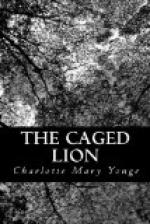Wondrous as were the walls, and deep-set as were the arches, they had all that peculiar slenderness of contour that Scottish taste seemed to have learnt from France; and a little more space was gained at the top, both of the gateway towers and the donjon, by a projecting cornice of beautifully vaulted arches supporting a battlement, that gave the building a crowned look. On the topmost tower was of course planted the ensign of the owner, and that ensign was no other than the regal ruddy Lion of Scotland, ramping on his gold field within his tressure fiery and counter flory, but surmounted by a label divided into twelve, and placed upon a pen-noncel, or triangular piece of silk. The eyes of the early fifteenth century easily deciphered such hieroglyphics as these, which to every one with the least tincture of ‘the noble science’ indicated that the owner of the castle was of royal Stewart blood, but of a younger branch, and not yet admitted to the rank of knighthood.
The early spring of the year 1421 was bleak and dreary in that wild lonely vale, and large was the fire burning on the hearth in the castle hall, in the full warmth of which there sat, with a light blue cloth cloak drawn tightly round him, a tall old man, of the giant mould of Scotland, and with a massive thoughtful brow, whose grand form was rendered visible by the absence of hair, only a few remnants of yellow locks mixed with silver floating from his temples to mingle with his magnificent white beard. A small blue bonnet, with a short eagle feather, fastened with a brooch of river pearl, was held in the hands that were clasped over his face, as, bending down in his chair, he murmured through his white beard, ’Have mercy, good Lord, have mercy on the land. Have mercy on my son,—and guard him when he goes out and when he comes in. Have mercy on the children I have toiled for, and teach me to judge and act for them aright in these sore straits; and above all, have mercy on our King, break his fetters, and send him home to be the healer of his land, the avenger of her cruel wrongs.’
So absorbed was the old man that he never heard the step that came across the hall. It was a slightly unequal step, but was carefully hushed at entrance, as if supposing the old man asleep; and at a slow pace the new-comer crossed the hall to the chimney, where he stood by the fire, warming himself and looking wistfully at the old Knight.
He was wrapped in a plaid, black and white, which increased the gray appearance of the pale sallow face and sad expression of the wearer, a boy of about seventeen, with soft pensive dark eyes and a sickly complexion, with that peculiar wistful cast of countenance that is apt to accompany deformity, though there was no actual malformation apparent, unless such might be reckoned the slight halt in the gait, and the small stature of the lad, who was no taller than many boys of twelve or fourteen. But there was a depth of melancholy in those dark brown eyes, that went far into the heart of any one who had the power to be touched with their yearning, appealing, almost piteous gaze, as though their owner had come into a world that was much too hard for him, and were looking out in bewilderment and entreaty for some haven of peace.




